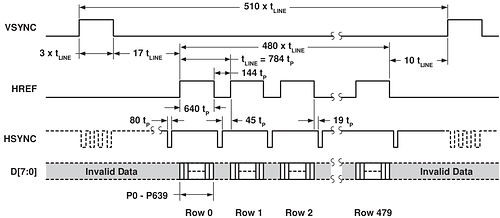ok time to post something! ![]() I'm making some nice progresses on DUE but I'm stuck with a couple of things:
I'm making some nice progresses on DUE but I'm stuck with a couple of things:
-
DUE can't get over 250000 baud rate or else it'll output garbage out of the serial. How do I overcome this and get at least a 1M baud? (can't belive DUE's serial is slower than UNO's!) For now I set a value of 63 (0x3F) for the 0x11 reg. Should be ok uh?
attachInterrupt(PCLK_PIN, pclk_rising, RISING); //hangs because (IMHO) pclk varies too fast firing too much interrupts. so I'm using a fallback code
while(!((portC = REG_PIOD_PDSR) << 22)); //but this looks wrong to me. isn't it?
Anyway here's the full code with an output frame and wiring instructions in code. It should write just the colorbar pattern. Any help would be appreciated!
#include <Wire.h>
#include <Arduino.h>
#define ADDRESS 0x21 //Define i2c address of OV7670
#define REGISTERS 0xC9 //Define total numbers of registers on OV7076
#define XCLK_FREQ 10 * 1000000
//3v3 3v3
//gnd gnd
//reset 3v3
//pwdn gnd
//SIOD SDA1 + 1k pullup
//SIOC SCL1 + 1k pullup
#define VSYNC_PIN 10
#define HREF_PIN 9
#define PCLK_PIN 8
#define XCLK_PIN 7
#define D0_PIN 25
#define D1_PIN 26
#define D2_PIN 27
#define D3_PIN 28
#define D4_PIN 14
#define D5_PIN 15
#define D6_PIN 29
#define D7_PIN 11
#define WIDTH 640
#define HEIGHT 480
volatile boolean onFrame = false;
volatile boolean onPixel = false;
void wrReg(byte reg, byte dat)
{
delay(5);
Wire1.beginTransmission(ADDRESS); //Start communication
Wire1.write(reg); //Set the register
Wire1.write(dat); //Set the value
Wire1.endTransmission(); //Send data and close communication
}
byte rdReg(byte reg)
{
delay(1);
Wire1.beginTransmission(ADDRESS); //Start communication
Wire1.write(reg); //Set the register to read
Wire1.endTransmission(); //Send data and close communication
Wire1.requestFrom(ADDRESS, 1); //Set the channel to read
while (Wire1.available() < 1); //Wait for all data to arrive
return Wire1.read(); //Read the data and return them
}
void printRegister(byte reg, int mode)
{
char tmpStr[80];
byte highByte = rdReg(reg); //Read the byte as an integer
if (mode == 0)
{
Serial.print(F("0x")); if (reg < 0x10) Serial.print(0, HEX); Serial.print(reg, HEX);
Serial.print(F(" : "));
Serial.print(F("0x")); if (highByte < 0x10) Serial.print(0, HEX); Serial.print(highByte, HEX);
}
if (mode == 1)
{
Serial.print("Register ");
sprintf(tmpStr, "%03d", reg); Serial.print(tmpStr);
Serial.print(" ");
itoa(reg, tmpStr, 16); sprintf(tmpStr, "0x%02d", atoi(tmpStr)); Serial.print(tmpStr);
Serial.print(" ");
itoa(reg, tmpStr, 2); sprintf(tmpStr, "0b%08d", atoi(tmpStr)); Serial.print(tmpStr);
Serial.print(": ");
sprintf(tmpStr, "%03d", highByte); Serial.print(tmpStr);
Serial.print(" ");
itoa(highByte, tmpStr, 16); sprintf(tmpStr, "0x%02d", atoi(tmpStr)); Serial.print(tmpStr);
Serial.print(" ");
itoa(highByte, tmpStr, 2); sprintf(tmpStr, "0b%08d", atoi(tmpStr)); Serial.print(tmpStr);
}
Serial.print("\r\n");
}
void printAllRegisters(int mode)
{
for (byte reg = 0x00; reg <= REGISTERS; reg++)
{
printRegister(reg, mode);
}
}
void setupXCLK()
{
pmc_enable_periph_clk(PWM_INTERFACE_ID);
PWMC_ConfigureClocks(XCLK_FREQ * 2, 0, VARIANT_MCK); //freq * period
PIO_Configure(
g_APinDescription[XCLK_PIN].pPort,
g_APinDescription[XCLK_PIN].ulPinType,
g_APinDescription[XCLK_PIN].ulPin,
g_APinDescription[XCLK_PIN].ulPinConfiguration);
uint32_t channel = g_APinDescription[XCLK_PIN].ulPWMChannel;
PWMC_ConfigureChannel(PWM_INTERFACE, channel, PWM_CMR_CPRE_CLKA, 0, 0);
PWMC_SetPeriod(PWM_INTERFACE, channel, 2);
PWMC_SetDutyCycle(PWM_INTERFACE, channel, 1);
PWMC_EnableChannel(PWM_INTERFACE, channel);
//pmc_mck_set_prescaler(2);
}
void vsync_rising() //frame start
{
onFrame = true;
}
void pclk_rising() //pixel start
{
onPixel = true;
}
void setup()
{
delay(5000);
Serial.begin(250000); //can't go any faster otherwise DUE would output garbage
setupXCLK();
Wire1.begin();
//Wire1.setClock(400000); //should work but needs some delay after every read/write. buggy?
//some registers to debug and test
wrReg(0x12, 0x80); //Reset all the values
wrReg(0x12, 0x02); //ColorBar
wrReg(0x42, 0x08); //ColorBar
//wrReg(0x15, 0x02); //VSYNC inverted
//wrReg(0x11, 0x82); //Prescaler x3 (10 fps)
wrReg(0x11, 60); //slow divider because of slow serial limit
//code to read registers and check if they were written ok
/*printRegister(0x01, 1);
printRegister(0x12, 1);
printRegister(0x15, 1);
printRegister(0x11, 1);
Serial.print(F("\n"));
printAllRegisters(1);*/
pinMode(D0_PIN, INPUT);
pinMode(D1_PIN, INPUT);
pinMode(D2_PIN, INPUT);
pinMode(D3_PIN, INPUT);
pinMode(D4_PIN, INPUT);
pinMode(D5_PIN, INPUT);
pinMode(D6_PIN, INPUT);
pinMode(D7_PIN, INPUT);
attachInterrupt(VSYNC_PIN, vsync_rising, RISING);
//attachInterrupt(PCLK_PIN, pclk_rising, RISING); // code hang here. Occur too fast?
}
bool singleFrame = true;
void loop()
{
//We take only one frame for testing purposes.
//You're free to comment next line to take multiple frames.
if (!singleFrame) return; singleFrame = false;
onFrame = false;
Serial.print(F("*FRAME_START*"));
while (!onFrame);
for (int i = 0; i < WIDTH * HEIGHT; i++)
{
//pin8 is port C22 as stated here -> http://www.arduino.cc/en/Hacking/PinMappingSAM3X
while (REG_PIOC_PDSR & (1 << 22)); //wait for low
Serial.write(REG_PIOD_PDSR & 0xFF);
while (!(REG_PIOC_PDSR & (1 << 22))); //wait for high
}
Serial.print(F("*FRAME_STOP*"));
}


